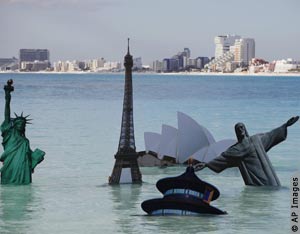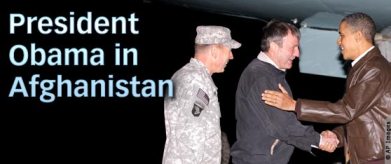While in the U.S., Australian Prime Minister Julia Gillard met with President Obama and Secretary of State Hillary Rodham Clinton and will address a joint session of the U.S. Congress. Defense Secretary Robert Gates sees progress in Afghanistan, but challenges remain. Leaen how female farmers in the developing world could help feed up to 150 million more hungry people. Clinton discusses International Women’s Day in an op-ed.
 Australia’s Prime Minister Visits the U.S.
Australia’s Prime Minister Visits the U.S.
(mobile version)
Australian Prime Minister Julia Gillard’s meetings with President Obama and Secretary of State Hillary Rodham Clinton focus upon shared efforts to transition the security control of Afghanistan to Afghan forces as well as expanding trade in the Pacific region. Gillard will also be addressing a joint session of the U.S. Congress March 9, which Obama says is “a high honor that is reserved for only our closest friends.”
Gates Sees Progress in Afghanistan
(mobile version)
Defense Secretary Robert Gates says that security gains achieved by Afghan and coalition forces across Afghanistan are significant, but the momentum must be maintained to begin a formal security transition later this year. “The gains we are seeing across the country are significant,” he says at a joint press conference in Kabul with President Hamid Karzai.
Secretary Clinton’s Op-Ed on International Women’s Day
(mobile version)
You’ve heard about the opportunities opening up in countries like China, regions like Asia and industries like green technology. But one major emerging market hasn’t received the attention it deserves: women. Today, there are more than 200 million women entrepreneurs worldwide. Women earn more than $10 trillion every year, which is expected to grow by $5 trillion over the next several years. In many developing countries, women’s incomes are growing faster than men’s.
 A Report on Feeding the Hungry
A Report on Feeding the Hungry
(mobile version)
With a little bit of help, female farmers in the developing world could help feed up to 150 million more hungry people in the world, according to a report issued by the Food and Agriculture Organization of the United Nations. Farming women in the rural areas of the world have lesser productivity than men currently, the report finds, but if they were given improved access to land, fuel, fertilizer, and seeds, they would have greater yields.


 Fossil Fuel Free by 2050
Fossil Fuel Free by 2050 Progress in Afghanistan, Pakistan
Progress in Afghanistan, Pakistan


 In Indonesia, @america
In Indonesia, @america International Journalists in the USA
International Journalists in the USA

 U.S. Backs India Security Council Bid
U.S. Backs India Security Council Bid Clinton on U.S.-Australia Trade
Clinton on U.S.-Australia Trade Controlling Dengue Fever
Controlling Dengue Fever